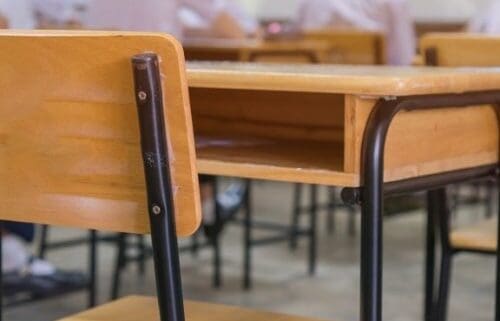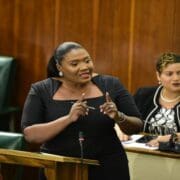One week away, new school year coming with a myriad of challenges Loop Jamaica
Black Immigrant Daily News
The first full resumption of face-to-face classes in the same general format as in the pre-COVID era is just days away, and it is no surprise that anticipation is high, as well as scepticism, over how smooth the first day on September 5 will progress, given the myriad of challenges facing the sector.
Among those challenges are issues relative to teacher migration, teacher compensation, public transportation, school infrastructure, and the mandatory Sixth Form Pathway Programme.
In fact, on Monday, the Ministry of Education and Youth, led by Portfolio Minister Fayval Williams, hosted a press conference to outline strategies to mitigate any potential falling out from the mass migration of teachers.
Willimas said 964 specialist teachers who recently completed their studies, are now available for employment in the national school system.
This was after the minister earlier confirmed that 167 teachers had resigned from their positions in the public school system over the past two months, and on Friday, the highly sought after Campion College indicated that 16 teachers had resigned from the institution approaching the new school year.
Of the 964 teacher graduates, Williams said there were significant numbers of mathematics and science teachers.
“We have some 29 English double majors, we have 140 mathematics double majors… we have some physical education teachers as well.
“We’re seeing primary education teachers, 259 of those, and we’re seeing social studies, Spanish, and French for a total of 964 teachers with specialisation who would have graduated from our teacher education institutions this year, and I am sure many of those would be taking up appointments in our schools,” she outlined.
Fayval Williams
Other strategies have also been employed, such as the hiring of retired teachers and persons with first degrees in relevant subject areas without teaching degrees.
The Opposition People’s National Party (PNP) had put forward its own strategies to address teacher migration a week before Williams’ press conference, including a call for persons without teaching diplomas to be trained and placed in classrooms.
Though some of the approaches have been implemented by the ministry, one of the island’s daily newspapers has been bombarded with several schools seeking teachers to fill vacant and part-time spots just days before the start of the new school year.
A prominent St Ann school in particular, advertised nine clear vacancies at the institution, including two chemistry teachers and one teacher each for biology, Spanish, visual arts, computer science and agriculture science.
And, amid those strategies employed by the Education Ministry to curb the teacher shortage, the Jamaica Teachers’ Association (JTA) – through data gathered from 140 schools across the island a week before its 58th annual conference earlier this week – said an estimated 600 teachers will not be returning to schools nationally come September 5.
Newly installed JTA President, La Sonja Harrison, who was speaking to the media, said the statistics revealed that of that number, 43 per cent of the teachers are resigning, 44 per cent are on leave, and 13 per cent have retired.
Another issue affecting teachers going into the new academic year that could demotivate educators is the vexed-issue of their compensation review.
Harrison told teachers that the JTA is not satisfied with the pace of the review, and has described it as being “shrouded” in secrecy. She also blasted the Government for taking a “hostage” approach to the wage negotiations.
“Is this indicative of that which is to come? Elimination of the bargaining process? I want our leaders to allay the fears of our teachers that this is not the case; even with their current bid to roll most of our negotiated allowances into basic salary — all to be taxed,” Harrison stated.
The transportation sector is also being closely monitored ahead of the first full physical engagement of students for a new school year in two years.
Widely described as being not adequate, the transportation system has been riddled with illegal operators jostling for fares along with the legal public transport operators.
The cost for rural students to access transportation is also seen as being astronomical, given the distances some children from deep rural Jamaica have to travel from to and from schools.
In Kingston Metropolitan Transport Region (KMTR), which includes much of St Catherine, the Jamaica Urban Transit Company (JUTC) has come under sharp scrutiny from Opposition Spokesman on Transport and Works, Mikael Phillips.
Mikael Phillips
In warning of a pending crisis and severe chaos in the movement of commuters for the start of the new school year, Phillips said the JUTC is now dispatching just over 100 units per day. This, he said, is instead of the 260 buses that are required for the summer schedule.
He also said the effective transit demand in the KMTR for the school term is more than 450 buses.
The statements by Phillips prompted the President of the Transport Operators Development Sustainable Services (TODSS), Egeton Newman, to also express concern about the state of public transportation approaching the new school year.
Newman called on the Ministry of Transport to say how licensed private transport operators can help to pick up some of the shortfalls that are expected in the transport sector, especially within the KMTR.
“Most of them don’t know where they are supposed to operate and whether they should be allowed to carry students or, with the present situation with the JUTC, if they would be targets of the police and Transport Authority inspectors.
Egeton Newman
“We are calling on the Minister of Transport and Mining to meet with private operators now to see how best we can work out any challenges for the new school year,” said Newman.
He added that there are spaces within the KMTR in which some 5,600 taxis are operated unofficially, and the operators are desirous of operating officially.
Newman said those units could very well take some of the pressure off the state-owned bus company.
But the JUTC responded, specifically to Phillips, and rejected any suggestion that it will not be ready for the new school year.
According to Managing Director of the JUTC, Paul Abrahams, the company is in “back-to-school mode right now and our preparations are ongoing”.
Added Abrahams in a media interview: “We’ve done back-to-school umpteen times”.
While he could not speak to the exact number of buses to be rolled out for September, the JUTC boss said the fleet will include rehabilitated buses.
He admitted, however, that “operations are looking at rationalising routes”, as the JUTC does not have all the resources and is in the business of using the resources as best as it possibly can.
Issues relative to the infrastructure of schools ahead of the new school year have also dominated headlines.
Two weeks ago, Opposition Spokesman on Education and Training, Senator Damion Crawford, called for immediate investment in the upgrading of school staffrooms to create an adequate and comfortable environment for teachers to work from.
Damion Crawford
In addition, he called for the ministry to address the poor and insufficient infrastructure at several schools across the island.
In a rare political move, Education and Youth Minister, Fayval Williams, agreed with Crawford and the Opposition for improvements to be made to school infrastructure.
“I have no quarrel at all with any call for is (at the Education Ministry) to upgrade the staff facilities at schools, and we will continue to do that within the constraints of the budget that we have,” said Williams on Monday at the Education Ministry’s press conference.
Speaking at the JTA’s annual conference on Wednesday, Williams said the ministry has allocated $210 million for critical repairs to schools across the island, with each of the seven regions within the ministry receiving $30 million.
She said so far, 97 schools have been identified for critical repairs.
The minister indicated that major upgrades to schools’ administrative blocks will be undertaken as part of plans to provide better working conditions for teachers and administrators.
“The objective of the ministry is to have an administrative block, properly configured, especially in our largest schools, and outfitted for the benefit of our teachers and administrators…
“We have to move more aggressively to create proper working spaces for our teachers; there is no disagreement on that. On the infrastructure front, that was the reason for having the sessions with our principals to talk about what we’re doing,” said Williams.
While plans are afoot to address the infrastructural problems at schools, there is a new cry for further classroom space from some principals to fill the gap based on requirements for the mandatory Sixth Form Pathways Programme.
Already, some 17,000 students have registered for the programme, according to Williams, who received a resounding “no” from teachers at the JTA conference to her call for an “amen” to the additional two years for the island’s students in the high school system.
That “no” from the teachers could be borne out of the reality that several schools are without the additional classrooms and educators for the programme to be successful.
The intention of the new sixth form programme is to offer students who completed grade 11 an opportunity to enrol and engage in skills-based or other academic-related courses alongside the traditional sixth form curriculum where the Caribbean Advanced Proficiency Examinations (CAPE) is offered.
Students have the the option of leaving the programme with an occupational associate degree, certificate or diploma, or an accredited associate degree through the Council of Community Colleges of Jamaica (CCCJ) or University Council of Jamaica (UCJ).
Linton Weir, the Principal of the St Catherine-based Old Harbour High School, in a radio interview, said he is faced with the challenge of finding more space to accommodate the students applying for the programme.
Additionally, he lamented that additional teachers are required for the programme.
“We will not be able to absorb them (the students) because we don’t have the space to absorb them and, two, we don’t have the teacher personnel to absorb them,” Weir informed.
Raymon Treasure, Principal of York Castle High School in St Ann, also said in the same radio interview, that he would not be able to absorb all the grade 11 students who graduated to the new sixth form programme.
Numerically, he said his school can only facilitate 150 of the 225 graduates under the Sixth Form Pathways Programme.
Treasure, without providing statistics, claimed that community colleges are experiencing reduced enrolment due to the sixth form programme.
This, he said, is against the reality that most high schools “don’t have the capacity to offer the programme in a meaningful way”, as the infrastructure and teachers are lacking.
However, the Principal of Mona High, Kevin Jones, is welcoming the Sixth Form Pathways Programme, despite the myriad of challenges some school administrators have highlighted.
Instead of complaining, Jones is encouraging his counterparts to implement the programme and monitor and document its progress. Thereafter, they should provide feedback to the Education Ministry, which can make any necessary adjustments in the years to come, he suggested.
“It is what we will have to do at this point in time,” Jones said, adding that the opportunity is to be welcomed, as many students leave grade 11 without the relevant skills or subjects.
When schools reopen on September 5, the level of learning loss and whether students are prepared to transition to new classes will also be closely monitored by their parents and teachers.
NewsAmericasNow.com








Leave a Reply
Want to join the discussion?Feel free to contribute!